Log in
Search
Latest topics
» Roger Harris revisitedby TD ABUSER Today at 2:30 am
» My latest doodle...
by batjac Yesterday at 10:05 pm
» Retail price mark-up.. how much is enough?
by gkamysz Yesterday at 9:29 pm
» Happy 77th birthday Andrew!
by roddie Yesterday at 9:22 pm
» My N-1R build log
by GallopingGhostler Yesterday at 3:04 pm
» Tee Dee .020 combat model
by 1/2A Nut Yesterday at 2:43 pm
» Chocolate chip cookie dough.........
by roddie Yesterday at 1:13 pm
» Purchased the last of any bult engines from Ken Enya
by sosam117 Yesterday at 11:32 am
» Free Flight Radio Assist
by rdw777 Yesterday at 9:24 am
» Funny what you find when you go looking
by rsv1cox Wed Nov 20, 2024 3:21 pm
» Landing-gear tips
by 1975 control line guy Wed Nov 20, 2024 8:17 am
» Cox NaBOO - Just in time for Halloween
by rsv1cox Tue Nov 19, 2024 6:35 pm
Cox Engine of The Month
1955 Frog 2.49cc BB
Page 1 of 1
 1955 Frog 2.49cc BB
1955 Frog 2.49cc BB
I wasn't expecting much from this engine when I bought it, 59 years old and it looked grim. It wasn't siezed but stiff and the contra piston was stuck.

Overnight in Hoppes No 9 And no further cleaning needed but contra piston still stuck. Heat wouldn't free it either. It started after three flicks and two minutes later the contra piston had freed.

Just needs a bit of crevice fettling now!

Overnight in Hoppes No 9 And no further cleaning needed but contra piston still stuck. Heat wouldn't free it either. It started after three flicks and two minutes later the contra piston had freed.

Just needs a bit of crevice fettling now!

ian1954- Diamond Member

- Posts : 2688
Join date : 2011-11-16
Age : 70
Location : England
 Re: 1955 Frog 2.49cc BB
Re: 1955 Frog 2.49cc BB
http://modelenginenews.org/ad/frog_unter.html Some thing to go with your frog (nice) You going to run it Ian ? Eric 

getback- Top Poster



Posts : 10441
Join date : 2013-01-18
Age : 67
Location : julian , NC
 Re: 1955 Frog 2.49cc BB
Re: 1955 Frog 2.49cc BB
With the Contra Piston stuck like it was, how were you able to get it to run? Maybe it was stuck in the right place?
Neat little engine, looks like the Hoppes worked well. Fettle away!
Neat little engine, looks like the Hoppes worked well. Fettle away!

Cribbs74- Moderator



Posts : 11907
Join date : 2011-10-24
Age : 50
Location : Tuttle, OK
 Re: 1955 Frog 2.49cc BB
Re: 1955 Frog 2.49cc BB
Cribbs74 wrote:With the Contra Piston stuck like it was, how were you able to get it to run? Maybe it was stuck in the right place?
Neat little engine, looks like the Hoppes worked well. Fettle away!
Not quite stuck in the right place but enough to fire up. It ran rough but once the contra piston had freed it was easy to tune up. Very noisy though!
This will be another engine to add to the ones I like to ogle and fondle!

ian1954- Diamond Member

- Posts : 2688
Join date : 2011-11-16
Age : 70
Location : England
 Re: 1955 Frog 2.49cc BB
Re: 1955 Frog 2.49cc BB
Slight hijack warning
Ian I bet you have an exploded view of a diesel engine.... I have no idea what a contra piston is or what it does and much too lazy to look it up as I am sure wiki or some other source is out there
Your many posts of diesel engines intrigues me and here among friends I am loosing my fear of seeming ignorant or stupid
Ian I bet you have an exploded view of a diesel engine.... I have no idea what a contra piston is or what it does and much too lazy to look it up as I am sure wiki or some other source is out there
Your many posts of diesel engines intrigues me and here among friends I am loosing my fear of seeming ignorant or stupid
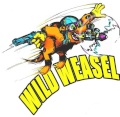
fredvon4- Top Poster


Posts : 4012
Join date : 2011-08-26
Age : 69
Location : Lampasas Texas
 Re: 1955 Frog 2.49cc BB
Re: 1955 Frog 2.49cc BB
Nice engine, glad to hear you got the contra piston freed up and er running! I had a PAW .15 single bearing where the contra piston froze in the bore in the running position. It took me forever to get it freed, I eventually ended up tearing the engine down and carefully pressed the contra piston out from the inside of the cylinder (contra piston is integrated into sleeve) ran fine after I got it back together. Are you planning on flying it?

TDbandit- Platinum Member

- Posts : 897
Join date : 2014-12-01
Age : 53
Location : Riverdale Georgia
 Re: 1955 Frog 2.49cc BB
Re: 1955 Frog 2.49cc BB
fredvon4 wrote:Slight hijack warning
Ian I bet you have an exploded view of a diesel engine.... I have no idea what a contra piston is or what it does and much too lazy to look it up as I am sure wiki or some other source is out there
Your many posts of diesel engines intrigues me and here among friends I am loosing my fear of seeming ignorant or stupid
Fred.
The best way to describe a contra-piston is that it's like a second piston in the same bore pointing downwards towards the piston, and acts as the head. It is adjusted up & down (it can slide in the bore) with the top adjusting screw to increase or decrease the compression. Screw it down, compression increases, advancing the timing. Screw it out and the compression pushes the contra-piston up, decreasing the compression and retarding the timing. Obviously the cylinder has to be taller than that of a glow engine to accommodate the contra-piston. Really, adjusting the compression is a bit like adding & removing head shims to a Cox to get the best performance.
Rod.

Oldenginerod- Top Poster

- Posts : 4018
Join date : 2012-06-15
Age : 62
Location : Drouin, Victoria
 Re: 1955 Frog 2.49cc BB
Re: 1955 Frog 2.49cc BB
I sort of figured that but from the discussions I assumed it is designed to move as the engine cycles. From your description it sounds like once set to a particular compression ratio it is adjusted only with changes to conditions or needle setting to arrive at a properly timed and feed setting. Sounds easy...but from various web sites I know it is not really that easy.
Now if they could just make fuel that was not foul smelling.....grin
Now if they could just make fuel that was not foul smelling.....grin

fredvon4- Top Poster


Posts : 4012
Join date : 2011-08-26
Age : 69
Location : Lampasas Texas
 Re: 1955 Frog 2.49cc BB
Re: 1955 Frog 2.49cc BB
The only one I know of that moves is the OK Cub diesels. They have a "shock pad" between the contra-piston and adjusting screw which allows the contra-piston to spring up slightly at each ignition to reduce the shock load on the bottom end. Some other OK engines used spring loaded clamps to hold the cylinder down. At ignition, the whole cylinder would spring up slightly to reduce shock.
Rod.
Rod.

Oldenginerod- Top Poster

- Posts : 4018
Join date : 2012-06-15
Age : 62
Location : Drouin, Victoria
 Re: 1955 Frog 2.49cc BB
Re: 1955 Frog 2.49cc BB
Here are some pics of the paperwork that came with one of mine:
George
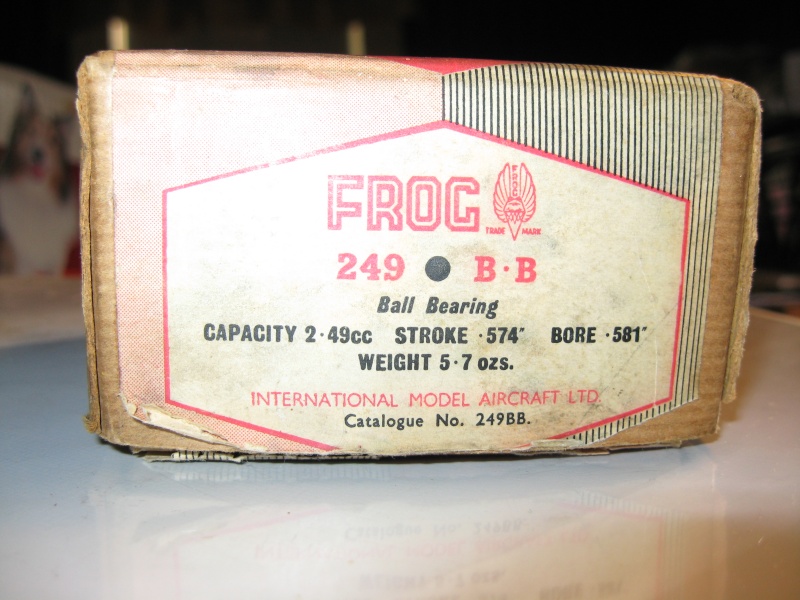

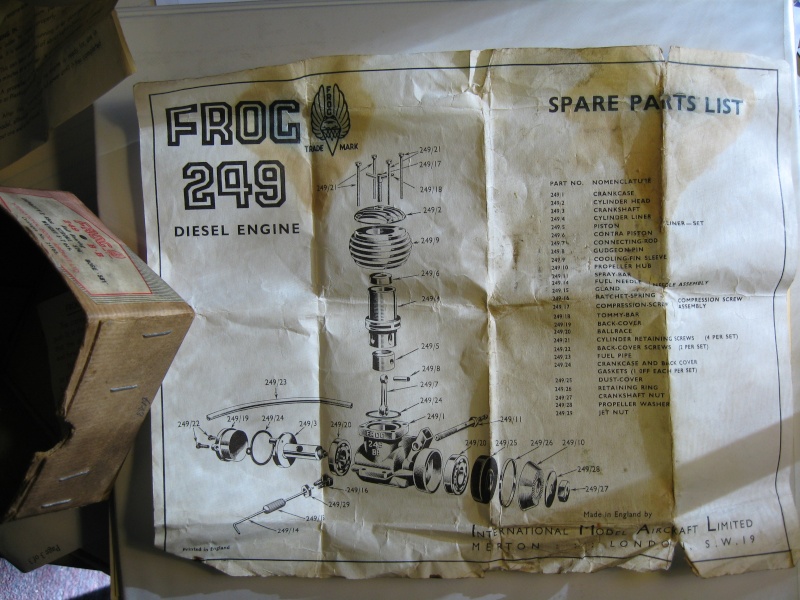




George








gcb- Platinum Member

- Posts : 908
Join date : 2011-08-11
Location : Port Ewen, NY
 Re: 1955 Frog 2.49cc BB
Re: 1955 Frog 2.49cc BB
The box and documentation look to be in perfect condition. I like the recommended fuel mix but it does seem to have a high proportion of ether. When I ran up mine it was 33% paraffin, 33% castor and 33% ether with a dash of isopropyl nitrate. We can't get amyl nitrate any more.

ian1954- Diamond Member

- Posts : 2688
Join date : 2011-11-16
Age : 70
Location : England
 Re: 1955 Frog 2.49cc BB
Re: 1955 Frog 2.49cc BB
Your 1/3 of each mix plus 2% is ideal to run any model diesel, and very good for running them in.
But many diesels once run in will give their best on various mixes.
Oliver Tiger 2.5cc mix is 50% kero, 30% ether, 20% castor plus 2% of IPN Oliver mix.
Webra Rekord 1.5cc mix is 30% kero, 40% ether, 30% castor plus 2% IPN Webra mix.
But many diesels once run in will give their best on various mixes.
Oliver Tiger 2.5cc mix is 50% kero, 30% ether, 20% castor plus 2% of IPN Oliver mix.
Webra Rekord 1.5cc mix is 30% kero, 40% ether, 30% castor plus 2% IPN Webra mix.

gossie- Gold Member

- Posts : 133
Join date : 2011-10-18
Location : Gold Coast Australia.
 Re: 1955 Frog 2.49cc BB
Re: 1955 Frog 2.49cc BB
gossie wrote:Your 1/3 of each mix plus 2% is ideal to run any model diesel, and very good for running them in.
But many diesels once run in will give their best on various mixes.
Oliver Tiger 2.5cc mix is 50% kero, 30% ether, 20% castor plus 2% of IPN Oliver mix.
Webra Rekord 1.5cc mix is 30% kero, 40% ether, 30% castor plus 2% IPN Webra mix.
I agree but it is my personal opinion that higher proportions of ether makes the fuel more expensive. Certainly, increasing the proportion of paraffin makes for a more powerful fuel. These are the PAW recommendations.
Running in - 30% Castor, 35% Paraffin, 33% Ether, 2% Iso Propyl Nitrate
Fully run in - 25% Castor, 40% Paraffin, 33% Ether, 2% Iso Propyl Nitrate
Fully run in
- BR Models - 20% Castor, 48% Paraffin, 30% Ether, 2% Isopropyl Nitrate
Fully run in
- TBR only
(Racing and Speed) - 15% Castor, 50% Paraffin, 32-33% Ether, 2-3% Iso Propyl Nitrate
I am not sure about dropping the castor content to 15% though. Diesels get very hot - I certainly wouldn't use synthetic oil in a diesel! But I do find ether proportions over 33% strange.

ian1954- Diamond Member

- Posts : 2688
Join date : 2011-11-16
Age : 70
Location : England
 Re: 1955 Frog 2.49cc BB
Re: 1955 Frog 2.49cc BB
[quote="ian1954"]
My guess would be that the oil (and ether) are replaced with kerosene for more power during competition. Also, some use non-standard lubricants that would be extremely expensive for general use. Then again, for top competition many do not care what they need to replace as long as the engine lasts through competition. Again, this is just a guess.
gossie wrote:I am not sure about dropping the castor content to 15% though. Diesels get very hot - I certainly wouldn't use synthetic oil in a diesel! But I do find ether proportions over 33% strange.
My guess would be that the oil (and ether) are replaced with kerosene for more power during competition. Also, some use non-standard lubricants that would be extremely expensive for general use. Then again, for top competition many do not care what they need to replace as long as the engine lasts through competition. Again, this is just a guess.

gcb- Platinum Member

- Posts : 908
Join date : 2011-08-11
Location : Port Ewen, NY
 Re: 1955 Frog 2.49cc BB
Re: 1955 Frog 2.49cc BB
When I posted the FROG 2.49 instructions, I forgot to post pictures of my FROGs.
The one in the lower left was bought new in the fifties but has a WEBRA general replacement needle assembly that was available at the time (yup! broke the original). One of the others was bought at a swap meet, the final one from the bay. Apparently all were made different years and have small differences. Also, only the upper one has an unaltered tommy bar, the others were brittle and the "T" had to be repaired.
Someone posted years ago that these engines are prone to splitting the crankcase...possibly due to the huge front BB. So far, so good.
George
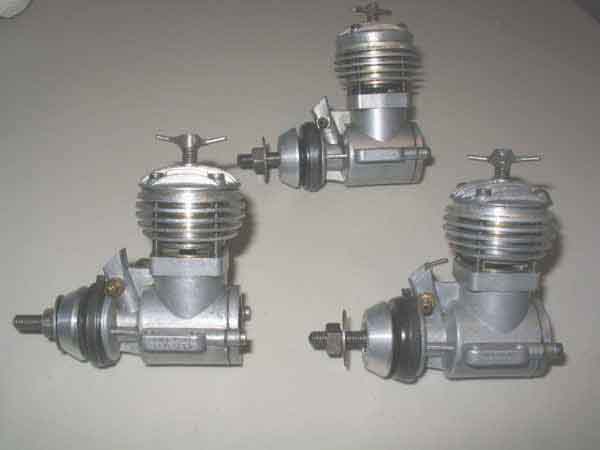
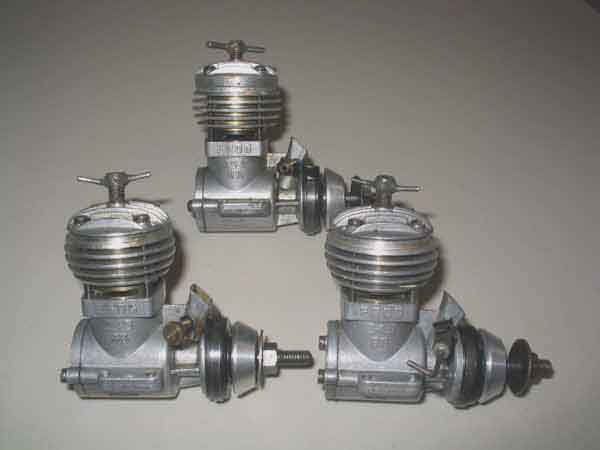
The one in the lower left was bought new in the fifties but has a WEBRA general replacement needle assembly that was available at the time (yup! broke the original). One of the others was bought at a swap meet, the final one from the bay. Apparently all were made different years and have small differences. Also, only the upper one has an unaltered tommy bar, the others were brittle and the "T" had to be repaired.
Someone posted years ago that these engines are prone to splitting the crankcase...possibly due to the huge front BB. So far, so good.
George



gcb- Platinum Member

- Posts : 908
Join date : 2011-08-11
Location : Port Ewen, NY
 Re: 1955 Frog 2.49cc BB
Re: 1955 Frog 2.49cc BB
I have used down to 15% oil (all castor) in the Irvine .20 diesel (a twin ballbearing, true ABC engine).
To me there is very little difference in the power, it is mainly the fuel consumption that is affected.
One can think of this as a certain available volume of air (at full throttle), and you cannot have more kerosene than what is need for an ideal mixture during each compression. So the net effect is that you get a longer run for a certain tank volume by using less oil in the fuel. In competitions with a limited tank volume you will want as much of that volume to be combustible fuel rather than lubricants, in order to extend the run (in time).
For sports application I use 25% all castor, it never hurts to have enough lubrication, and I can use the same fuel for all engines, ballbearing or plain bearing ones.
I'm running the Queen Bee dieselconversion on this fuel too and it feels very smooth and well lubricated.
To me there is very little difference in the power, it is mainly the fuel consumption that is affected.
One can think of this as a certain available volume of air (at full throttle), and you cannot have more kerosene than what is need for an ideal mixture during each compression. So the net effect is that you get a longer run for a certain tank volume by using less oil in the fuel. In competitions with a limited tank volume you will want as much of that volume to be combustible fuel rather than lubricants, in order to extend the run (in time).
For sports application I use 25% all castor, it never hurts to have enough lubrication, and I can use the same fuel for all engines, ballbearing or plain bearing ones.
I'm running the Queen Bee dieselconversion on this fuel too and it feels very smooth and well lubricated.

Surfer_kris- Diamond Member

- Posts : 1912
Join date : 2010-11-20
Location : Sweden
 Similar topics
Similar topics» 1955 Frog 1.49 "Vibramatic" Diesel
» Zom 2.49cc G series D 1985
» ED Super Fury 1.49cc
» ED Super Fury 2.49cc
» Frog 349 BB CL
» Zom 2.49cc G series D 1985
» ED Super Fury 1.49cc
» ED Super Fury 2.49cc
» Frog 349 BB CL
Page 1 of 1
Permissions in this forum:
You cannot reply to topics in this forum

 Rules
Rules






